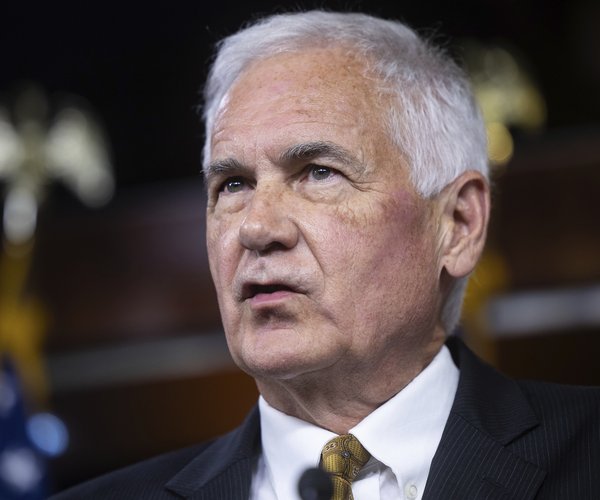Rep. John Duarte (R-Modesto) threw his support behind Donald Trump this week, calling the former president’s conviction on 34 felony counts a “miscarriage of justice” and saying it was “a completely constructed case as to what crimes would be applied.”
While that aligns with the GOP rhetoric coming out of Washington, that stance might be a calculated risk back home. Duarte narrowly won two years ago in a purple district, which, had it been drawn in 2020 as it is today, would’ve favored President Biden by 11 points.
“I know it’s risky,” said Duarte, who serves on the Agriculture, Natural Resources, Transportation and Infrastructure committees. “Could I be more pragmatic? Yeah. But where are we going to be in 20 or 30 years if I didn’t stand up to abuse of our legal system, and our country has degraded into one with a weaponized court system? That’s not something I want to be a part of.”
Turlock makes up a small portion of Duarte’s 13th congressional district, where Democrats make up of 42 percent of the electorate compared to Republicans, who make up 29 percent.
Rep. Tom McClintock (R-El Dorado Hills) has a chunk of Turlock in his 5th congressional district, and he too has been critical of Trump’s conviction and supports the former president. But he can afford to be critical. Unlike Duarte, McClintock’s district is categorized by pundits as being safely in the Republican column. Duarte’s race with Democrat Adam Gray (D-Merced) is expected to be among the closest in the nation.
“I do think if the presidential race, as it’s expected to be, remains relatively close, then (the 13th) is a seat that the Democrats should carry,” said Erin Covey, house analyst for the Cook Political Report, which classifies the race as a toss-up.
Duarte defeated Gray, a former Assemblymember, by just 564 votes for the seat in 2022. It was the second-closest race in the country that cycle.
“This is another example of John Duarte being yes-man to the most extreme members of the Republican party,” said Gray, who served in Sacramento for 10 years. “I have never voted for a candidate with 34 felony convictions and I don’t plan on starting on 2024. Thirty-four convictions is a good baseline for somebody who’s not qualified to hold public office.”
Duarte believes what he calls the “persecution” of Trump will resonate with immigrant voters, who in many instances have fled persecution themselves.
“People come here from all over the world seeking the American dream,” said Duarte, whose district is more than 60 percent Hispanic. “We have a free society, a market economy, fair courts and a functioning democracy. And many have left countries where those elements are in flux. They’ll look at the abuse of our justice system and worry that country they chose to make their new home is more like where they left.”
Stanislaus State political scientist Stephen Routh cautioned against trying to boil down the complexities of ethnicity-based politics into a single soundbite.
“The inherent difficulties don’t work well in a newspaper article,” said Routh. “They’re more suited for a 200-page dissertation.”
Routh thinks Duarte might be guilty of whistling past the graveyard if he expects the Trump conviction will sway immigrants.
“That’s not a political analysis there, but a campaign narrative,” said Routh. “It’s an attempt to frame the discourse to make people see it that way. This situation is very fluid, and efforts by parts of society to understand what they think of the conviction is still malleable. Campaigns are desperate to prime the voters to get them to think the way they want them to think.”
Covey, too, is skeptical that immigrants will rally around Trump.
“I think there has certainly been a shift in Hispanic voters the last couple of years, but it’s concentrated in other parts of country,” said Covey. “It’s hard to tell with not enough high-quality polling … but I don’t think that Trump’s conviction helps him uniquely among Hispanic voters, which is what Duarte seems to suggest.”
Covey points to Duarte’s congressional neighbor to the south, Rep. David Valadao (R-Hanford) of the 22nd district, as a Republican who is handling the Trump controversy differently.
Like Duarte, Valadao faces a tough race against former five-term Assemblymember Rudy Salas (D-Bakersfield). Unlike Duarte, Valadao has remained silent about Trump’s legal woes. Valadao is one of two House Republicans — Rep. Dave Newhouse (WA-04) is the other — who voted to impeach Trump and still holds office. The others either retired or were voted out.
“Duarte is less experienced than Valadao, so it’s not surprising to me that he’s been a little more vocal about Trump than Valadao,” said Covey. “Valadao will get asked about this constantly over the next five months. Do you get it over with and deal with it now? Or do you avoid it as much as possible? It’s a difficult position. It’s a catch-22 for them.”
Routh said that as an observer of politics, the race for the 13th district is a fascinating case study. Currently, the House is comprised of 218 Republicans and 213 Democrats, with four seats vacant.
“The implications of this race are absolutely huge,” said Routh. “This could be the election that determines who controls the House of Representatives. And those are enormous stakes.”





